 By Alzheimer's Research and Prevention Foundation
Be one of the elite professionals to achieve this unprecedented credential! Start stepping up the professional ladder and positioning yourself for better jobs and higher pay. At this time, there is no cure for fatal Alzheimer's disease and prevention is key to avoiding this 6th leading cause of death in the U.S. Fitness has been found through research to be instrumental in prevention. As the world population continues to grow and live longer, the issues of accompanying cognitive decline, dementia, and fatal Alzheimer's disease are becoming more prevalent, significantly impacting quality of life, health care systems, and the economy of many countries. This specialist certificate prepares you to provide valuable intervention for clients with the disease, and to help others prevent and delay cognitive decline.

Cancer is the second leading cause of death in the United States. Since the 1960's cancer survival rates have improved and progress has been made in treatments, causing a huge population of cancer survivors. The most prevalent form of cancer for females is breast cancer. Many women now survive breast cancer for months, or years, or are cured of the disease for the rest of their life. Treatment for breast cancer can be difficult to recover from physically and mentally. Exercise is an excellent means to breast cancer recovery and prevention.
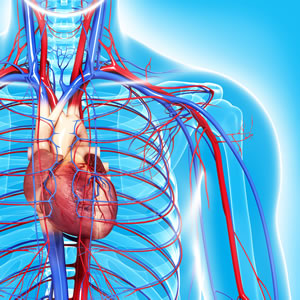
Many clients that come to you have one or more of the primary chronic diseases: heart disease, respiratory disease, cancer, or diabetes/metabolic syndrome. This certificate program consists of 5 eLearning courses to help you screen and build a strong foundation for working with clients with chronic disease.
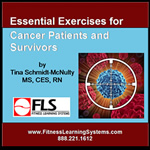 By Tina Schmidt-McNulty MS, RCEP, RNCancer is the second leading cause of death in the United States. It is a very serious diagnosis with a multifaceted approach starting from identification all the way through treatment. Cancer patients are now encouraged to exercise during and after treatment. This course includes important information for health-fitness professionals about cancer and exercise guidelines. Videos guide you through a simple exercise progression for clients with cancer or who are cancer survivors. In the search for a cure, physical activity proves a valuable tool in prevention, treatment, and a progressive return to daily living activities. Learn how to embrace this client base and provide safe and effective programming options.
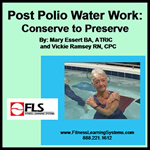 By Mary Essert, BA, ATRI, Vickie RamseyAs a health-fitness professional, you may encounter clients with Post Polio Syndrome. Exercise is important, but can easily cause or accelerate serious problems. It is imperative to understand how to effectively and safely work with these clients without causing harm to occur or symptoms to re-occur. Although this course focuses on water exercise, the information is valuable to land exercise as well. Techniques to increase range of motion, strength, endurance and relaxation are clearly shown. Videos and text emphasize independence and functional fitness as the goal. Learn important guidelines for how to work with clients with Post Polio Syndrome and learn how to help them "Conserve to Preserve" to improve and maintain quality of life.
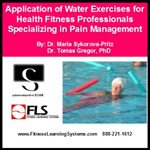 By Maria Sykorova-Pritz, Ed.DThe number of people suffering from chronic pain conditions is growing indicating a need for effective chronic pain management programs. Chronic pain associated health care costs is estimated to be $80 billion each year in the USA alone. People suffering from chronic pain need to be fully educated about the process of managing pain. Knowledge is power for the chronic pain sufferer. With the information and techniques presented in this course, you as a health-fitness professional can increase your client's ability to manage chronic pain.
 By June Lindle-Chewning, BS, MA, Tina Schmidt-McNulty MS, RCEP, RNBlood pressure is an integral part of the function and health of the cardiorespiratory system. High blood pressure (Hypertension), low blood pressure (Hypotension), Pulmonary Hypertension, and Preeclampsia all have implications for safe and effective exercise prescription.
This course provides knowledge for understanding the anatomy and physiology of blood pressure and its role in health. It teaches you how to screen for blood pressure and provides exercise training and special considerations for clients with blood pressure disease.
Learn guidelines to provide individualized exercise recommendations to help clients prevent or delay hypertension. In addition, this course guides the health-fitness professional to help clients with blood pressure disease to safely and effectively exercise to help control the disease.
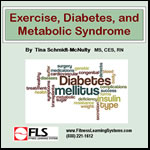 By Tina Schmidt-McNulty MS, RCEP, RNAccording to the American Heart Association, over 47 million Americans have metabolic syndrome. That is approximately one out of every six people. Every health-fitness professional will encounter diabetic clients. This course will help prepare you to effectively work with these clients on many levels. Scenarios are included to help you prepare for inevitable diabetic incidents with clients.
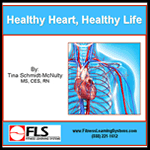 By Tina Schmidt-McNulty MS, RCEP, RN, Tina Schmidt-McNulty MS, RCEP, RNHeart disease and its complications is the leading cause of death in the US for both men and women. Exercise plays an important role in prevention and treatment of heart disease. This course explores risk reduction, prevention, and management of heart disease through lifestyle changes and exercise. Learn how to safely and effectively lead your clients to a healthier heart and a healthier life.
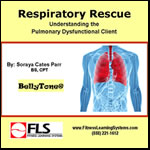 By Soraya Cates Parr, BS, CPTChronic lower respiratory disease, primarily COPD, was the third leading cause of death in the United States in 2011, according to the CDC. Also, the number of people with asthma continues to grow. Learn guidelines for working with pulmonary dysfunctional clients, breathing exercises, and how to help overcome the fear that accompanies an increased demand on the respiratory system. Learn how to effectively help these clients improve function and quality of life.
 By Danielle Noblitt Spangler BS, NASM, Certified Applied Functional Science Gray InstituteThe female body is structurally different from the male body both anatomically and in its need for pelvic alignment and health. Working with the female body before, during, and after pregnancy requires a working knowledge of female anatomy in all three stages to prepare, accommodate, and restore a woman's body to alignment and health.
This course reviews female anatomy and the anatomy of pregnancy to guide you with pregnant clients. Learn the importance of breathing and posture, guidelines for exercise, contraindications, special considerations, and safe exercises for pregnant clients. Knowledge is key to safety and effectiveness in exercise for your pregnant clients.
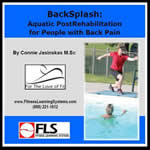 By Connie Jasinskas M.Sc.Over 80% of the U.S. population suffers from low back pain at some time in their life, some with chronic low back pain issues. Most low back pain is attributed to muscle imbalance and is relieved and prevented by a properly executed exercise program conducted by a knowledgeable professional. This course shows how vertical aquatic exercise can be used in post-rehabilitation for back pain by aquatic rehabilitation practitioners, as well as aquatic leaders providing individual or group exercise for this population. Videos and pictures give you a clear understanding of the exercises and progressions shown in the course. If you want to get exceptional results with your back pain clients, this course is a must!
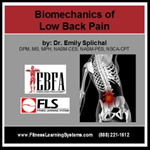 By Emily Splichal, DPM, MS, MPHAlmost 80% of American adults will suffer low back pain at some point. Interestingly, 70-80% of low back pain is associated with musculoskeletal imbalances and improper core activation during everyday movement. Join us as we take a look at the latest research on the biomechanics of low back pain. From the hip to the foot, you will be surprised by how many different imbalances attribute to low back pain. Help your clients get their bodies back in balance and move pain free!
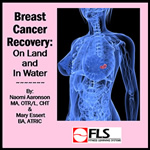 By Naomi Aaronson, MA, OTR/L, CHT, Mary Essert, BA, ATRIThere are over 2 million breast cancer survivors in the United States today. Due to the ramifications of treatment, exercise is a modality that can be used to facilitate recovery. Numerous studies have demonstrated that exercise can improve quality of life, reduce side effects of treatment, and improve strength and endurance. This course will help health-fitness professionals understand diagnosis, treatment, and ongoing care for cancer patients and survivors. Important guidelines and information are provided for safe and effective exercise through course and multimedia content. Embrace this client base with practical exercise options to improve recovery and function.
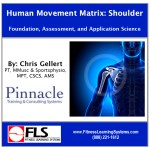 By Chris Gellert, PT, MMusc & Sports Physio, MPT, CSCS, C-IASTMThe shoulder is one of the most vulnerable joints in the body due to its vast range of motion and complexity. This course is developed to assist the health-fitness professional with a deeper understanding of the functional anatomy, mechanics, and assessment of the shoulder. Improve your knowledge and skills gaining a competitive edge by successfully working with clients with shoulder dysfunction within a safe and effective scope of practice.
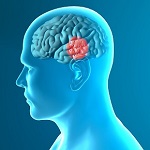 By Abdul Qayyum Rana, MD FRCPC, FRCP (HON)
The incidence of Parkinson's disease is seen in all races. Almost 10 million individuals worldwide are affected by Parkinson's disease and the number is increasing as people live longer. Health-fitness professionals who work with the general public and older adults will encounter clients and patients with Parkinson's disease. Understanding the basics of the disease allows professionals to recognize disease progression and be aware of and learn how to manage numerous possible symptoms and related problems, allowing those with PD to live longer with better quality of life.
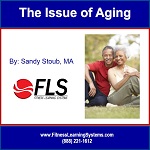 By Sandy Stoub, BA, MAThis course provides an important overview of aging through physiological, psychological, and sociological perspectives. With a thorough understanding of the aging body, a health-fitness professional can design effective programs to meet the needs of students. Videos and exercise descriptions are included for chair and standing exercises as well as exercises for in the water. Meet the demands of this growing population with safe and effective exercise options.
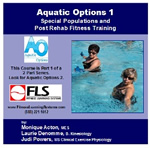 By Monique Acton, MS, Laurie Denomme, B. Kinesiology, Judi Powers, MSThis course is the first module of a two-part series. Aquatic Options was specifically designed for aquatic fitness professionals, Personal Trainers, Physical Therapy Assistants, Occupational Therapy Assistants, Recreational Therapists, and any professional working with special populations and post rehab individuals in the aquatic environment. This course will review important fitness training guidelines and help you better understand how to integrate progressive aquatic fitness exercises for shoulder, knee and hip orthopedic considerations and low back pain.
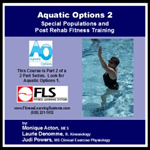 By Monique Acton, MS, Laurie Denomme, B. Kinesiology, Judi Powers, MSThis course is the second module in the Aquatic Options series. Aquatic Options was specifically designed for aquatic fitness professionals and any professional working with special populations and post rehab individuals in the aquatic environment. In this course you will learn modifications for participants with specific medical conditions including arthritis, diabetes, hypertension, and obesity, and be introduced to the assessment, evaluation, documentation, and reporting process. Choose appropriate equipment for all of the populations, and be able to design your own safe and effective aquatic fitness programming.
 By Aquatic Exercise Association (AEA)Whether designing aquatic programming for the professional athlete, the "armchair" athlete, or somewhere in between, this course will provide numerous options for improving performance and functional capabilities using creative and carefully developed aquatic exercise. The focus is on formatting for optimum efficiency in relation to a variety of student goals: sports related, recreational activity, or daily function. Participant goals, muscle involvement and equipment interaction are considered, along with movement patterns to improve performance and enhance exercise retention at any level of activity or sport.
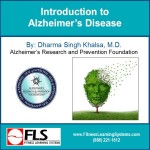 By Alzheimer's Research and Prevention Foundation (ARPF)At this time, there is no cure for fatal Alzheimer's disease and prevention is key to avoiding this 6th leading cause of death in the U.S. Fitness has been found through research to be instrumental in prevention. As the world population continues to grow and live longer, the issues of accompanying cognitive decline, dementia, and fatal Alzheimer's disease are becoming more prevalent, significantly impacting quality of life, health care systems, and the economy of many countries.
This course provides important information to help you understand cognitive decline and Alzheimer's relevant to anyone working as a health-fitness professional. It focuses on causes, risk factors, diagnosis, care partners, The 4 Pillars of Alzheimer's Prevention™, and preventive mental exercise.
 By Aquatic Exercise Association (AEA)Older Adults comprise the fastest growing segment of the American population and aquatic exercise can help them maintain functional fitness and independent living skills. A thorough review of the physiological aspects of aging in this course will introduce aquatic fitness professionals to important considerations for providing safe and effective programming for the older adult population. This course includes programming and exercise descriptions with videos for three levels of senior aquatic programming to help you reach the needs of ALL older adults!
 By American Academy of Sports Dietitians and Nutritionists (AASDN)The percentage of consumers (your clients) who actively seek information about nutrition and healthful eating has more than doubled from 19% in 2000 to 46% in 2011. It is important for health-fitness professionals to be properly qualified and guided to join the fight against obesity with science-based information and counsel for clients following the Academy of Nutrition and Dietetics (AND) guidelines.
The AASDN creates a fundamental understanding of science-based nutrition concepts in this course. The goal is to allow you to be able to better separate the science-based food and nutrition information from the plethora of misinformation, to properly advise and communicate about nutrition with your clients.
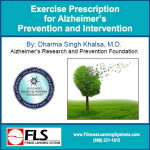 By Alzheimer's Research and Prevention Foundation (ARPF)At this time, there is no cure for fatal Alzheimer's disease and prevention is key to avoiding this 6th leading cause of death in the U.S. Fitness has been found through research to be instrumental in prevention. As the world population continues to grow and live longer, the issues of accompanying cognitive decline, dementia, and fatal Alzheimer's disease are becoming more prevalent, significantly impacting quality of life, health care systems, and the economy of many countries.
This course reviews statistics, definitions, risk factors, and stages of disease progression. The primary focus of this course is evidence-based preventive physical exercise for prevention and intervention. Exercise guidelines and considerations are provided and sample programs are included.
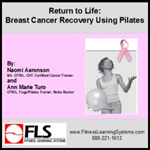 By Naomi Aaronson, MA, OTR/L, CHT, Ann Marie Turo, OTCancer is a disease that affects both mind and body. More and more cancer survivors are coming to health-fitness professionals to regain strength, mobility, and endurance. Pilates principles and movements are great for restoring function to Breast Cancer Survivors. You can incorporate these principles for your group fitness and personal training clients without being certified or highly experienced in Pilates. This course provides sound information about breast cancer and its process, along with several exercise video clips to aid you in working with breast cancer clients to help them regain a connection to their body. Use these principles to facilitate your cancer survivors' "return to life."
Not approved by your
certifying organization?
Our courses are very affordable
even when you use our easy
petition process.
Click Here for Additional Information about
Continuing Education Approval
- As an IACET Authorized Provider, Fitness Learning Systems offers CEUs for its programs that qualify under the ANSI/IACET Standard.
- ACSM: American College of Sports Medicine's Professional Education Committee certifies that Fitness Learning Systems meets the criteria for official ACSM
Approved Provider status from (2018 – 2020). Providership # 652725. ACSM approved providership of this program does not imply
endorsement of the sponsoring organization's products/services.
FLS courses are more affordable than
many other home study courses even with a petition
fee!
|